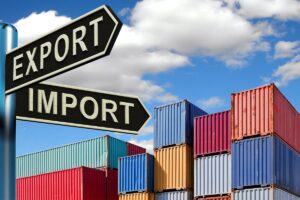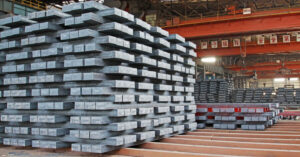
The volume of imports to Ukraine in January-October 2023 amounted to $52.17 billion, which is 18.2%, or $8.03 billion, more than in the same period a year earlier.
At the same time, the volume of Ukrainian exports decreased by 19.1%, or $7.03 billion, to $29.83 billion, according to the website of the State Customs Service.
The negative balance for the first 10 months of this year amounted to $22.34 billion, which is 3.1 times more than in the same period last year.
According to the State Customs Service, exports of goods fell by 18.1% to $27.1 billion in the first nine months of the year, while imports increased by 18.9% to $46.6 billion, and the negative balance of trade in goods increased by 3.2 times to $19.5 billion.
It is specified that over the first 10 months of this year, imports from the EU increased by 23.5% to $26.71 billion, while exports decreased by 15.8% to $19.45 billion.
At the same time, imports from the CIS countries fell 4.2 times to $1.03 billion in January-October this year compared to the same period last year, while exports from Ukraine to these countries fell 36.4% to $1.33 billion, making trade with these countries surplus, whereas before the war it was traditionally deficit.
Finally, imports from other countries increased by 34% to $24.42 billion over 10 months of this year, while imports decreased by 22.4% to $9.04 billion.
“At the same time, taxable imports amounted to $43.4 billion, which is 83% of the total volume of imported goods. The tax burden per 1 kg of taxable imports in January-October 2023 amounted to $0.49 per kg, which is 44% more than in the same period in 2022,” the release said.
According to the State Customs Service, the countries from which Ukraine imported the most goods were: China – $8.4 billion ($6.6 billion in 10 months of 2022), Poland – $5.5 billion ($4.4 billion) and Germany – $4.1 billion ($3.7 billion).
Most of Ukraine’s goods were exported to Poland – $4.1 billion ($5.7 billion), Romania – $3.3 billion ($3.0 billion), and Turkey – $2.0 billion ($2.4 billion).
In January-October 2023, 65% of the total volume of imported goods was machinery, equipment and transport – $16 billion (UAH 115.2 billion, or 31% of customs revenues, was paid to the budget during customs clearance), chemical products – $9.3 billion (UAH 63.6 billion, or 17%), fuel and energy products – $8.7 billion (UAH 79.3 billion, or 21%).
It is specified that imports of machinery, equipment and transport increased by 30%, chemical products – by 17%, while fuel and energy products decreased by 18%.
The top three most exported goods from Ukraine are: food products – $17.7 billion (down 4%), metals and metal products – $3.3 billion (down 19%), machinery, equipment and transport – $2.5 billion (down 30%).
The State Customs Service added that UAH 500.7 million was paid to the budget during customs clearance of exports of goods subject to export duties.
The State Customs Service also reported that in 10 months of 2023, customs authorities detected violations of customs rules worth UAH 7.6 billion.

In January-October this year, Ukraine reduced exports of carbon steel semi-finished products in physical terms by 40.4% year-on-year to 1 million 34,588 thousand tons.
According to the statistics released by the State Customs Service (SCS), exports of semi-finished carbon steel products amounted to $529.584 million in monetary terms over the period (down 51.6%).
The main exports were made to Bulgaria (35.42% of supplies in monetary terms), Poland (23.85%) and Italy (9.97%).
In January-October, Ukraine imported 92 tons of semi-finished products from China worth $169 thousand, while in September-October, no imports were made.
As reported, in 2022, Ukraine decreased exports of carbon steel semi-finished products in physical terms by 72% compared to the previous year, to 1 million 899.729 thousand tons, and in monetary terms by 70.9%, to $1 billion 191.279 million. The main exports were made to Bulgaria (26.55% of supplies in monetary terms), Poland (13.97%) and Italy (12.13%).
In addition, Ukraine imported 5,558 thousand tons of similar products in 2022, which is 85.7% less than in 2021. In monetary terms, imports decreased by 86% to $3.634 million. Imports were carried out from the Russian Federation (96.92% of supplies before the war), China (1.84%), and Romania (1.21%).

In January-October this year, Ukraine reduced exports of titanium ores and concentrate in physical terms by 96.3% year-on-year to 10.170 thousand tons.
According to statistics released by the State Customs Service (SCS) on Wednesday, exports of titanium ores and concentrate decreased by 84.7% to $16.983 million in monetary terms.
The main exports were to Turkey (36.92% of supplies in monetary terms), Japan (18.90%) and the Netherlands (6.04%).
During the period, Ukraine imported 1 ton of such ore from the Netherlands for $2 thousand.
As reported, in 2022, Ukraine reduced exports of titanium ore and concentrate in physical terms by 41.8% compared to the previous year to 322.143 thousand tons, and in monetary terms by 19.6% to $130.144 million. At the same time, the main exports were made to the Czech Republic (47.91% of supplies in monetary terms), the United States (11.94%) and Romania (9.75%).
In 2022, Ukraine imported 196 tons of similar products from Senegal (70.41%) and Turkey (29.59%) for $115 thousand.
In Ukraine, titanium ores are currently mined mainly by the United Mining and Chemical Company (UMCC), which manages Vilnohirsk Mining and Metallurgical Plant (VGMK, Dnipro region) and Irshansk Mining and Metallurgical Plant (Irshansk, Dnipro region). ) and Irshansk Mining and Processing Plant (IGOK, Zhytomyr region), as well as Mezhirichinsky GOK and Valky Ilmenite (both based in Irshansk, Zhytomyr region).
In addition, Velta (Dnipro) has built a mining and processing plant at Birzulivske deposit with a capacity of 240 thousand tons of ilmenite concentrate per year.

In January-October this year, Ukraine reduced exports of processed pig iron in physical terms by 3.2% compared to the same period last year, to 1 million 113.079 thousand tons.
According to the statistics released by the State Customs Service (SCS), pig iron exports in monetary terms amounted to $423.414 million in the period under review (down 26.3%).
At the same time, exports were carried out mainly to Poland (56.20% of supplies in monetary terms), Spain (22.64%) and the United States (6.24%).
In ten months of 2023, Ukraine imported 79 tons of pig iron worth $132 thousand from Germany (50.38%) and Brazil (49.62%), while in October, imports of pig iron amounted to $1 thousand. In the same period last year, 16 tons of pig iron were imported from Germany for $29 thousand.
As reported, in 2022, Ukraine reduced exports of processed pig iron by 59% in physical terms compared to the previous year – to 1 million 325.275 thousand tons, and by 61.1% in monetary terms – to $638.774 million.
In 2022, Ukraine imported 40 tons of pig iron worth $23 thousand, while in 2021 it imported 185 tons of pig iron worth $226 thousand.
Exports were made mainly to the United States (38.47% of supplies in monetary terms), Poland (32.91%), and Turkey (8.12%), while imports were made from Germany (100%).